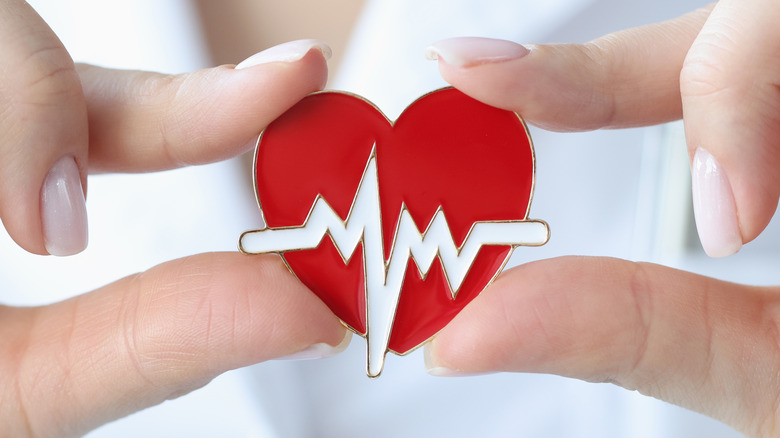When Should You Worry About A Low Heart Rate?
Your heart typically beats between 60 to 100 beats per minute (bpm) during each waking hour of your day. While you're asleep, it might dip below that — between 40 and 60 beats (per Cleveland Clinic). If you're a hardcore athlete, your resting heart rate might average well below 60 beats. However, if you're inactive or over 65, a heart rate below 60 bpm might be a cause for concern.
Bradycardia is a condition when your average heart rate drops below 60, according to the American Heart Association. Bradycardia can cause your energy and stamina to be low. You also might feel dizzy, weak, or confused. Cleveland Clinic notes that you could experience chest pains or heart palpitations. If you experience these symptoms, see a doctor to monitor how your heart is working and what might be causing your symptoms. Left untreated, bradycardia could result in a lack of oxygen to your brain or congestive heart failure.
What causes a low heart rate and how can it be prevented?
The most common cause of bradycardia is when the heart's chief pacemaker, the sinus node, fails to trigger a heartbeat. Sometimes the chambers of the heart don't communicate effectively, which can cause bradycardia, according to Johns Hopkins Medicine. Factors that can lower your heart rate to unhealthy levels include a reaction from your vagus nerve, an increase in intracranial pressure, some drugs, and sleep apnea. In addition to those over 65, those with excessive blood pressure may also have bradycardia (per Mayo Clinic). You may be more susceptible to having a low heart rate if you smoke, consume large amounts of alcohol, or use illegal substances. Stress and anxiety can also cause bradycardia. In addition, a low heart rate can be brought on by heart disease, a history of heart attacks, hypothyroidism, or an electrolyte imbalance (via Cleveland Clinic).
The Mayo Clinic recommends frequent exercise and a diet rich in fruit, vegetables, and whole grains that is low in fat, sugar, and sodium to keep your heart healthy. It's also best to keep a healthy weight and routinely check your cholesterol and blood pressure. If you drink alcohol, limit your intake to one drink a day for women and two drinks for men. If you smoke cigarettes, find a smoking cessation program so that you can maintain a healthy ticker.


